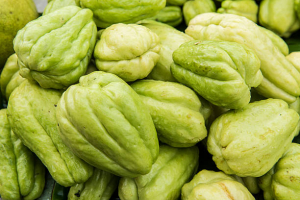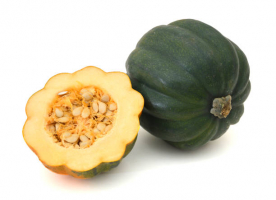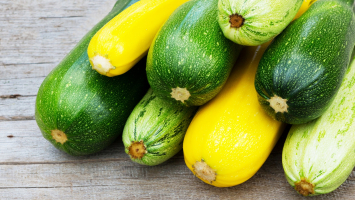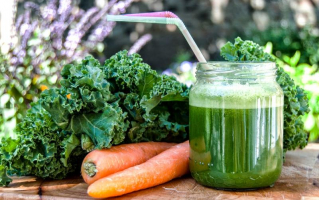Top 12 Health Benefits of Butternut Squash
Winter squash with orange flesh known as butternut is praised for its adaptability and sweet, nutty flavor. Despite being frequently mistaken for a vegetable, ... read more...butternut squash is actually a fruit. It has a wide range of culinary applications and is a wonderful accent to many savory and sweet dishes. In addition to being delicious, butternut squash is also a powerhouse of antioxidants, vitamins, and minerals. Everything you need to know about the advantages of butternut squash for your health is provided in this article.
-
Butternut squash has an astoundingly high nutritional content. It contains all the nutrients and vital chemicals needed to maintain a human's fitness and health. Although butternut squash can be eaten raw, it is most frequently roasted or baked. One cup (205 grams) of cooked butternut squash provides:
- Calories: 82
- Carbs: 22 grams
- Protein: 2 grams
- Fiber: 7 grams
- Vitamin A: 457% of the Reference Daily Intake (RDI)
- Vitamin C: 52% of the RDI
- Vitamin E: 13% of the RDI
- Thiamine (B1): 10% of the RDI
- Niacin (B3): 10% of the RDI
- Pyridoxine (B6): 13% of the RDI
- Folate (B9): 10% of the RDI
- Magnesium: 15% of the RDI
- Potassium: 17% of the RDI
- Manganese: 18% of the RDI
As you can see, butternut squash is high in nutrients yet low in calories. Vitamins A, B1, B2, B3, B5, B6, B9, C, E, folate, beta-carotene, fiber, calcium, phosphorus, zinc, iron, manganese, potassium, and magnesium are added to butternut squash as supplements.
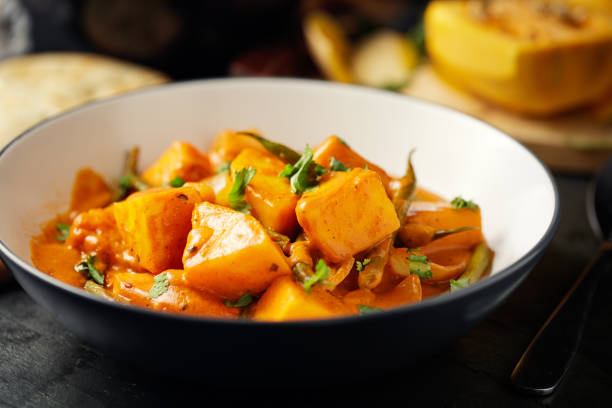
Rich in Nutrients and Low in Calories 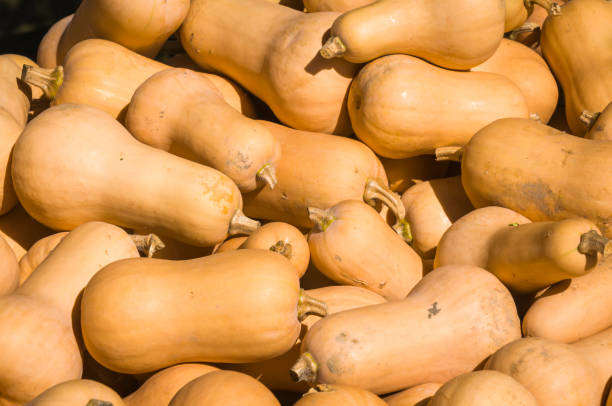
Rich in Nutrients and Low in Calories -
A great source of many vitamins and minerals is butternut squash. A cup (205 grams) of cooked butternut squash contains more than 450% of the recommended daily intake (RDI) of vitamin A and more than 50% of the RDI of vitamin C. Additionally, it contains a lot of carotenoids, which are plant pigments that give butternut squash its vivid color. Examples of these pigments are beta-carotene, beta-cryptoxanthin, and alpha-carotene. These substances are provitamin A carotenoids, which means that your body transforms them into retinal and retinoic acid, the forms of vitamin A that are actually active. Cell development, eye health, bone health, and immunological function are all regulated by vitamin A.
It is also essential for the growth and development of the fetus, making it a crucial vitamin for expectant moms. Vitamin C, a water-soluble component required for immunological function, collagen formation, wound healing, and tissue repair, is also abundant in butternut squash. The powerful antioxidant properties of vitamins A and C help your body fight off the harm that unstable molecules called free radicals may do to your cells. Another antioxidant included in butternut squash is vitamin E, which aids in preventing free radical damage and may lower your chance of developing age-related diseases like Alzheimer's disease. Additionally, this winter squash is a rich source of B vitamins, such as folate and B6, which your body requires for energy and the production of red blood cells.
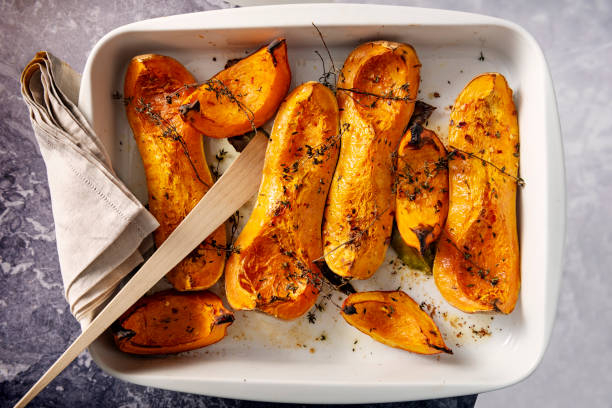
Packed With Vitamins and Minerals 
Packed With Vitamins and Minerals -
According to research, eating a diet rich in certain of the antioxidants contained in butternut squash, such as vitamin C and carotenoid antioxidants, can lower your chance of developing certain malignancies. For instance, research has shown that increasing your consumption of vitamin C and beta-carotene in your diet may lower your chance of developing lung cancer. According to a study of 18 research, individuals who consumed the most beta-carotene had a 24% reduced chance of developing lung cancer than those who consumed the least.
Another analysis of 21 trials revealed that for every additional 100 mg of vitamin C taken daily, the chance of developing lung cancer dropped by 7%. Higher blood levels of beta-carotene were also linked to a considerably decreased risk of all-cause mortality, including cancer death, according to a study of 13 research.

May Decrease Cancer Risk 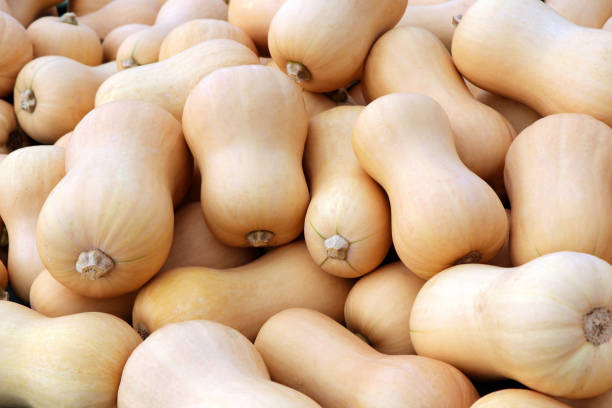
May Decrease Cancer Risk -
Consuming fruits and vegetables have long been linked to a decreased risk of heart disease. However, it has been shown that foods that are yellow or orange, such as butternut squash, are very good at preventing heart disease. These colorful veggies' antioxidant content has a significant influence on heart health.
According to research of 2,445 participants, eating more daily servings of yellow-orange veggies reduced the incidence of heart disease by 23%. These veggies include carotenoids, which are believed to preserve heart health by decreasing inflammation, blood pressure, and the expression of certain genes linked to heart disease.

May Decrease Heart Disease Risk 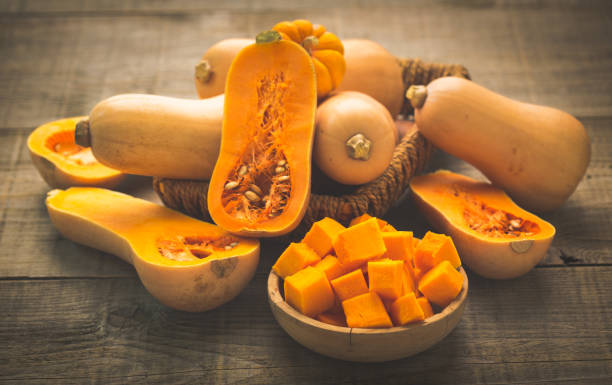
May Decrease Heart Disease Risk -
Cooked butternut squash offers just 83 calories per cup (205 grams) and 7 grams of satisfying fiber, making it a great option for weight loss and body fat reduction. Both soluble and insoluble fiber is present. Particularly, soluble fiber has been linked to fat loss and has been demonstrated to decrease hunger, both of which are crucial when attempting to limit your calorie consumption. A higher dietary fiber consumption encourages weight reduction and lowers body fat, according to research. According to research including 4,667 kids and teenagers, those who consume the most fiber had a 21% lower chance of becoming obese than people who consume the least.
Additionally, research including 252 women found that weight was reduced by 0.55 pounds (0.25 kg) and fat decreased by 0.25 percentage points for every one gram increase in total dietary fiber. Additionally, eating a lot of fiber may help you lose weight over time. Women who consumed the most fiber over the course of an 18-month trial lost more weight than those who consumed the least, demonstrating the importance of fiber for sustained weight reduction. Reduce hunger and increase your intake of fiber by including butternut squash in your meals.

May Aid Weight Loss 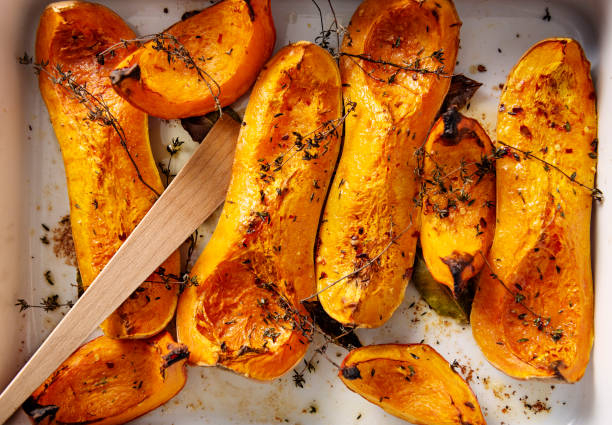
May Aid Weight Loss -
Maintaining healthy eyes and skin is one of butternut squash's biggest health advantages. Although the word "vitamin A" can refer to both retinoids and carotenoids, it is often thought of as a single nutrient. The best source of the four different carotenoids -carotene, -carotene, zeaxanthin, and lutein is butternut squash. Carotene is converted by the body to retinol, a kind of vitamin A needed to maintain healthy eyes and radiant skin.
The only carotenoids that function as antioxidants in the retina are zeaxanthin and lutein, which protect against age-related conditions including macular degeneration and cataracts. The suggested daily vitamin Men's consumption is 3000 IU (International Units), while women's intake is 2333 IU. With 14,882 IU, just a cup of cubed butternut squash surpasses the recommended daily allowance. The RDA (Recommended Daily Allowance), which is essential for sustaining good vision, is more than 350% present in this food. The two potent antioxidants lutein and zeaxanthin help to safeguard eyesight.
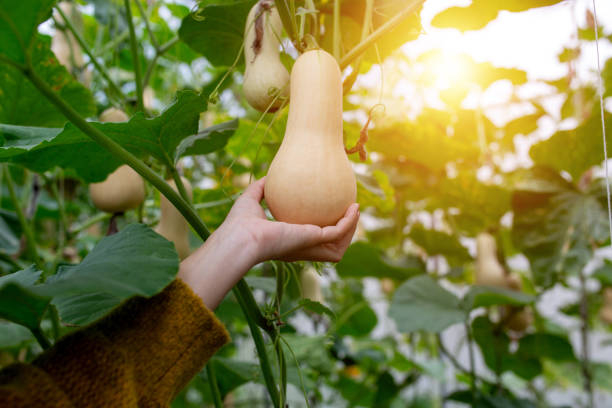
Good For Eyes And Skin 
Good For Eyes And Skin -
There is soluble and insoluble fiber in butternut squash. The insoluble fiber aids in giving the food that has been digested bulk so that it may move more easily through the digestive system and avoid causing constipation. Soluble fiber, on the other hand, slows down the absorption of the carbs and reduces blood sugar increases after meals. Additionally, soluble fiber reduces cholesterol by expelling it from the body. Butternut squash has 3g of fiber per cup. Men are advised to consume roughly 8% of it, while women are advised to consume 12%.
17% of the daily necessary manganese intake is found in butternut squash, which supports the body's ability to maintain a strong bone structure. Additionally, it absorbs calcium, enhancing the spinal cord's mineral content. Butternut squash's vitamin C takes care of collagen creation, which is important for increasing bone mass. Other important minerals found in squash, including iron, zinc, folate, and other trace elements, help build strong bones and protect against osteoporosis.
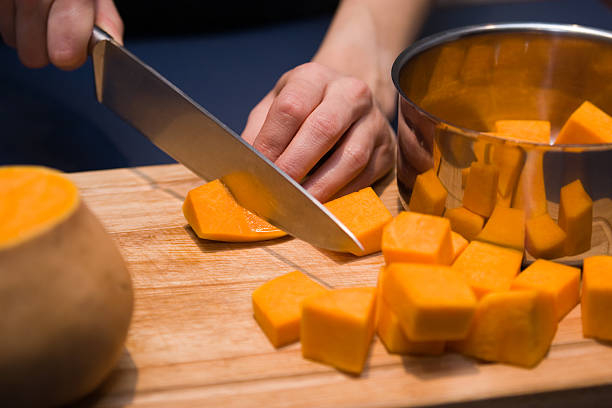
Prevent Constipation And Improve Bone Health 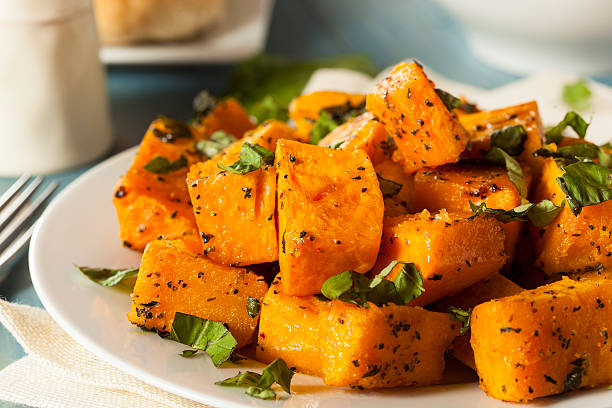
Prevent Constipation And Improve Bone Health -
Minerals that split into molecules are exactly what are known as electrolytes. Their bodily fluids act as conductors of electricity. They elicit muscular contractions and nerve signals. Electrolytes also aid in regulating the flow of fluid into and out of cells to ensure that the body maintains a proper equilibrium. You might be shocked to learn that butternut squash contains magnesium, calcium, and potassium—three essential electrolytes. The body's electrical impulses are initiated by potassium, which also works with sodium to regulate heartbeats and stimulate muscular contractions.
Calcium increases the contraction of the heart muscles while magnesium calms them. 10% of the recommended daily potassium intake, 11% of the recommended daily magnesium intake, and 7% of the recommended daily calcium intake are all found in one cup of butternut squash.
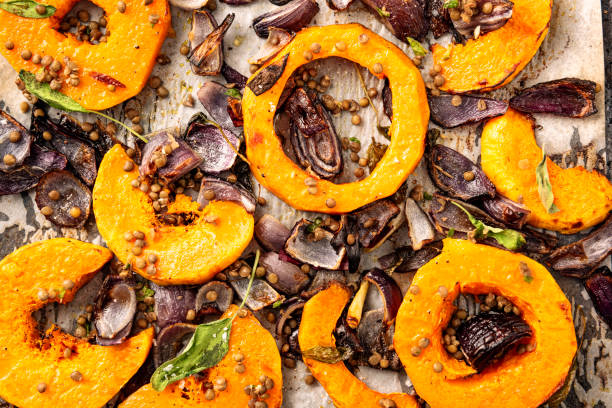
Balances The Muscles and Nerves 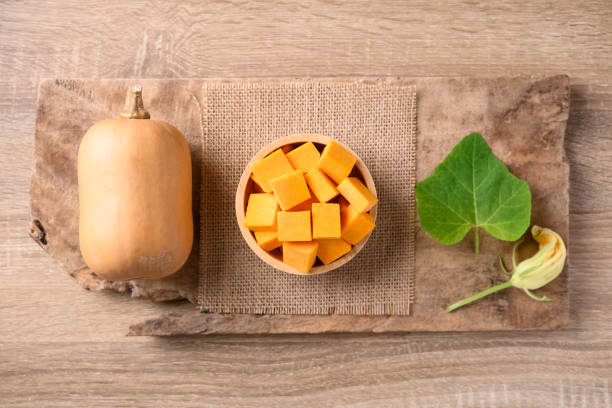
Balances The Muscles and Nerves -
Butternut squash has antioxidants that work to combat free radicals and stop cellular damage, inflammation, and other chronic disorders. The cellular structure that generates energy is specially protected by the manganese content. Water and oil do not mix. As a result, vitamin E serves the precise purpose of acting as an antioxidant barrier against chemicals that are soluble in fat. It is an antioxidant and a fat-soluble vitamin, which protects the lipids and forms healthy cell walls.
The majority of free radicals, including those that harm skin cells, are neutralized by vitamin C, a water-soluble vitamin that circulates throughout bodily fluids. A cup of freshly chopped butternut squash supplies 39% of the daily requirement of vitamin C for women and 32% for men. 13% of the daily value of vitamin E comes from vitamin E.

Prevent Inflammation And Chronic Disorders 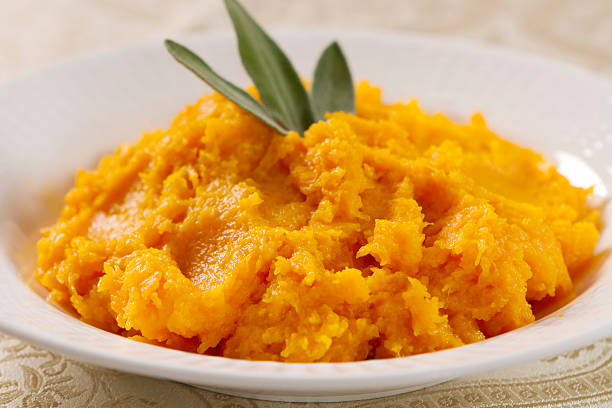
Prevent Inflammation And Chronic Disorders -
The ability of butternut squash to help control blood sugar levels and stave off type II diabetes is one of its finest health advantages. Although butternut squash contains numerous essential minerals that naturally regulate insulin levels, the molecule d-chiro-inositol from vitamin B is frequently credited.
The overall role of vitamin B-complex, which is widely present in squash, is strongly related to the control of blood sugar levels in the body. In reality, butternut squash contains a combination of six B-complex vitamins, including folate, thiamine, riboflavin, pyridoxine, and pantothenic acid (B9).
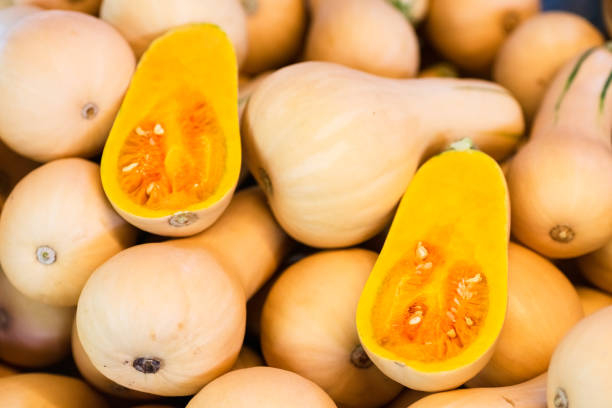
Deals With Type II Diabetes 
Deals With Type II Diabetes -
Butternut squash has the ability to regulate blood pressure, which is one of its biggest health advantages. The potassium and magnesium in butternut squash work together to provide a helpful protective barrier against various cardiovascular issues. Potassium relaxes the blood capillaries and arteries by acting as a vasodilator. It guarantees healthy blood flow and eases cardiac strain.
It increases the functionality of numerous bodily organs by increasing their oxygenation. The pectin in squash also reduces the incidence of atherosclerosis, strokes, and heart attacks by scraping off all the extra cholesterol from the artery walls. Squash also has the added benefit of lowering homocysteine levels, another important contributor to cardiovascular problems.
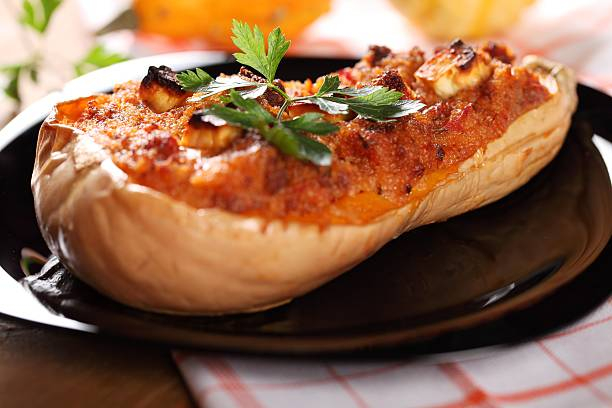
Better Cardiovascular Health 
Better Cardiovascular Health -
Squash has various health advantages, with the immune system ranking highly among them. It contains magnesium, vitamin C, and other crucial antioxidant substances to squelch all of the body's free radicals. Free radicals are harmful consequences of cellular metabolism, in case you didn't know. They have been linked to several disorders, including heart disease, cancer, and premature aging. Squash, on the other hand, has a lot of vitamin A and other phytonutrients that help to strengthen the immune system. It protects against damaging free radicals and foreign compounds the body produces.
Butternut squash has essential levels of folate, a vitamin that is crucial for pregnant women. For the development of the baby's neural characteristics, folic acid or folate is necessary. Folate insufficiency is frequently cited as the main contributing factor to the majority of neural tube abnormalities. Thus, including butternut squash in the diet can have a positive impact on one's health.
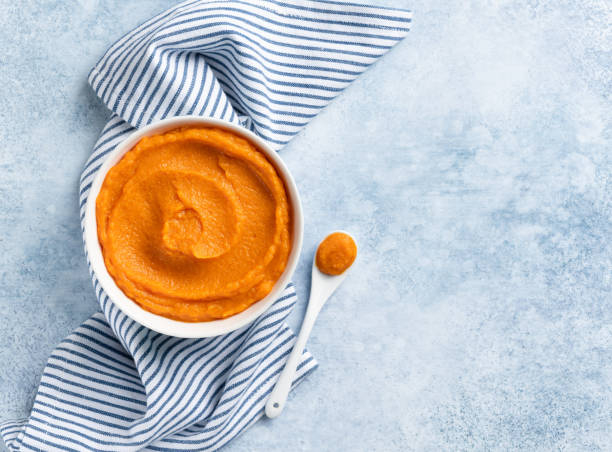
Healthy Immune System 
Healthy Immune System














